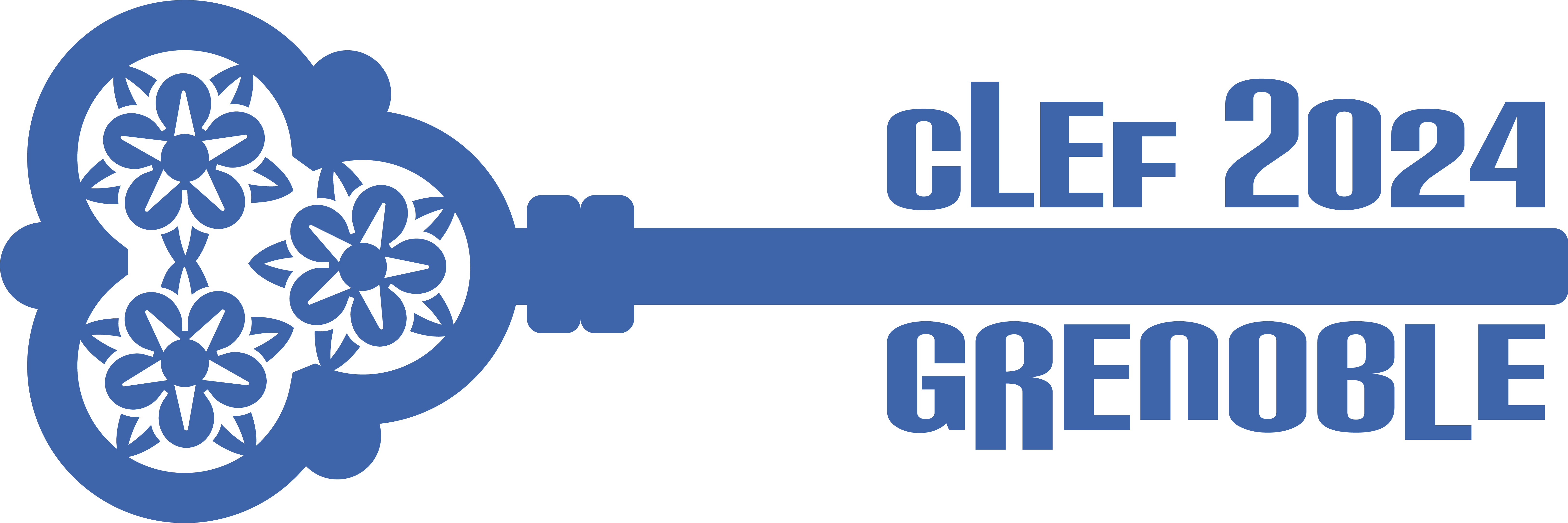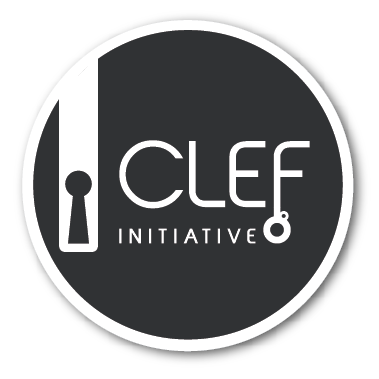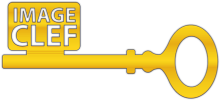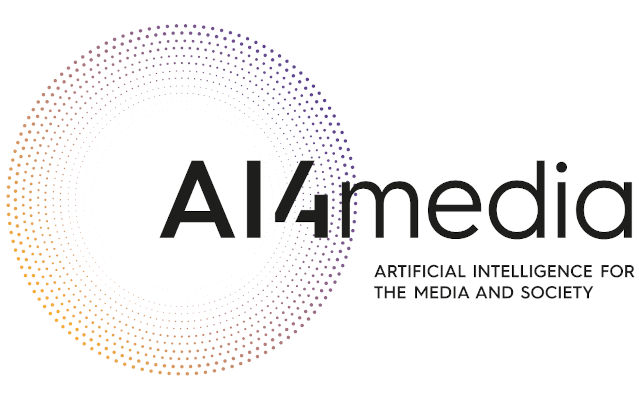- ImageCLEF 2024
- LifeCLEF 2024
- ImageCLEF 2023
- LifeCLEF 2023
- ImageCLEF 2022
- LifeCLEF2022
- ImageCLEF 2021
- LifeCLEF 2021
- ImageCLEF 2020
- LifeCLEF 2020
- ImageCLEF 2019
- LifeCLEF 2019
- ImageCLEF 2018
- LifeCLEF 2018
- ImageCLEF 2017
- LifeCLEF2017
- ImageCLEF 2016
- LifeCLEF 2016
- ImageCLEF 2015
- LifeCLEF 2015
- ImageCLEF 2014
- LifeCLEF 2014
- ImageCLEF 2013
- ImageCLEF 2012
- ImageCLEF 2011
- ImageCLEF 2010
- ImageCLEF 2009
- ImageCLEF 2008
- ImageCLEF 2007
- ImageCLEF 2006
- ImageCLEF 2005
- ImageCLEF 2004
- ImageCLEF 2003
- Publications
- Old resources
You are here
ImageCLEF 2024
Sponsors
Motivation
Given the successful ImageCLEF 2003-2023 benchmarking campaigns, ImageCLEF 2024 edition (https://www.imageclef.org/, https://www.facebook.com/imageclef, https://twitter.com/imageclef) will continue to evaluate the technologies for annotation, indexing, classification and retrieval of multimodal data, with its main objective residing in providing access to large collections of multimodal data for multiple usage scenarios and domains.
Considering the experience of the last editions, ImageCLEF 2024 will continue approaching a diversity of applications, namely medical, social media and Internet, and recommending, giving to the participants the opportunity to deal with interdisciplinary approaches and domains. ImageCLEF 2024 will continue the experience of the engaging tasks from 2023 edition, while some of the other tasks are discontinued.
ImageCLEF 2024 is organized as part of the CLEF Initiative Labs.
The results of the campaign appear in the working notes proceedings, published by CEUR Workshop Proceedings (ceur-ws.org, e.g., 2023 http://ceur-ws.org/Vol-3497/). Selected contributions among the participants, will be invited for publication in the following year in the Springer Lecture Notes in Computer Science (LNCS) together with the annual lab overviews (e.g., 2023 https://link.springer.com/book/10.1007/978-3-031-42448-9).
The target audience for ImageCLEF 2024 is mainly expected to be from the multimodal data annotation and retrieval community, from fields such as computer vision, image information retrieval and digital image processing. Due to the success and the specific nature of the medical tasks, a significant part of the audience will come from the medical informatics, machine learning and pattern recognition community.
Stay tuned with us for the latest information and updates by joining us on the ImageCLEF social media accounts: Twitter #imageclef, and Facebook @ImageClef.
ImageCLEF2023 schedule
Each of the tasks sets its own schedule, so please check the corresponding task webpage for specific dates. A (tentative) global schedule can be found below:
- 30.11.2023: registration opens for all ImageCLEF tasks
- 22.04.2024: registration closes for all ImageCLEF tasks
- 17.01.2024: development data release starts (depends on the task)
- 14.03.2024: test data release starts (depends on the task)
- 06.05.2024 : deadline for submitting the participants runs (depends on the task)
- 13.05.2024 : release of the processed results by the task organizers (depends on the task)
- 31.05.2024 : deadline for submission of working notes papers by the participants
- 21.06.2024: notification of acceptance of the working notes papers
- 08.07.2024 : camera ready working notes papers
- 09-12.09.2024: CLEF 2024, Grenoble, France
The CLEF Conference
 |
 |
ImageCLEF lab and all its tasks are part of the Conference and Labs of the Evaluation Forum: CLEF 2024. CLEF 2024 will be hosted by the University of Grenoble Alpes, France, 9-12 September 2024 and consists of an independent peer-reviewed workshops on a broad range of challenges in the fields of multilingual and multimodal information access evaluation, and a set of benchmarking activities carried in various labs designed to test different aspects of mono and cross-language information retrieval systems. More details about the conference can be found here. Also there is more information about the CLEF Initiative.
Programme of ImageCLEF at the CLEF 2024 Conference
Participant registration
ImageCLEF is an evaluation lab and starting from this edition it will be managed by the ImageCLEF team through the AI4Media benchmarking platform (based on Codalab). The main features of the platform are: online registration system, end-user agreement submission, data distribution, a leaderboard system as well as interaction with participants, reducing the administrative overhead. The platform is now up for participants' registration.
https://ai4media-bench.aimultimedialab.ro/competitions/public/
Please note that the registration is a two-step process. In order to participate in an ImageCLEF task, you must first accept its specific terms and conditions, which are listed on the 'Get Started -> Terms' tab of the tasks hosted on the AI4MediaBench platform. The registration form is mandatory. Within the form, you have the option to choose one or more ImageCLEF tasks from the provided list. Once the form is completed, your application will be applicable to all selected tasks hosted on AI4MediaBench. After completing the form, you must apply to the tasks you have selected in the terms and conditions via the 'Participate' tab of the tasks.
Please do not register separately on the official CLEF 2024 registration page. Registrations on the AI4Media Bench Platform will automatically be transmitted to CLEF.
In case the sub(task) is not present on the AI4Media Bench Platform, please contact the task responsibles (listed on the bottom of each task page).
The Tasks
ImageCLEF 2024 proposes 4 main tasks:
- (8th edition) ImageCLEFmedical: Multimodal data can be used in different scenarios. For example, manual generation of the knowledge of medical images is a time-consuming process prone to human error. As this process requires assistance for the better and easier diagnoses of diseases that are susceptible to radiology screening, it is important that we better understand and refine automatic systems that aid in the broad task of radiology-image metadata generation. Thus, we proposed:
- (8th edition) automatic image captioning;
- (2nd edition) synthetic medical images created via GANs;
- (2nd edition) Visual Question Answering for colonoscopy images;
- (2nd edition) Multimodal And Generative TelemedICine (MAGIC).
- (3rd edition) ImageCLEF Retrieval for Arguments: Good images provide powerful visual communication and can strengthen an argumentative position. However, despite recent advances, conventional image retrieval is not well suited to finding images that support a particular point of view. The task is to fill this gap and develop techniques for finding suitable images for argumentative texts.
- (2nd edition) ImageCLEFrecommending: This task focuses on content-recommendation for cultural heritage content in 15 broad themes that have been curated by experts in the Europeana Platform (https://www.europeana.eu/en/themes). Despite current advances, there is limited understanding how well these perform and how relevant they are for the final end users. This task aims to fill this gap by developing ground truth data of recommendations in the above themes and by allowing benchmarking different recommendation systems and methods.
- (1st edition) ImageCLEFtoPicto: This task introduces two new challenges whose objective is to provide a translation in pictograms from a natural language, either from (i) text or (ii) speech understandable by the users, in this case, people with language impairments.
Overview Paper
The Organising Committee
Overall coordination
- Bogdan Ionescu <bogdan.ionescu(at)upb.ro>, National University of Science and Technology Politehnica Bucharest, Romania
- Henning Müller <henning.mueller(at)hevs.ch>, University of Applied Sciences Western Switzerland, Sierre, Switzerland
- Ana-Maria Drăgulinescu <ana.dragulinescu(at)upb.ro>, National University of Science and Technology Politehnica Bucharest, Romania
Technical support
- Ivan Eggel <ivan.eggel(at)hevs.ch>, University of Applied Sciences Western Switzerland, Sierre, Switzerland
- Liviu-Daniel Ștefan <liviu_daniel.stefan(at)upb.ro>, National University of Science and Technology Politehnica Bucharest, Romania

